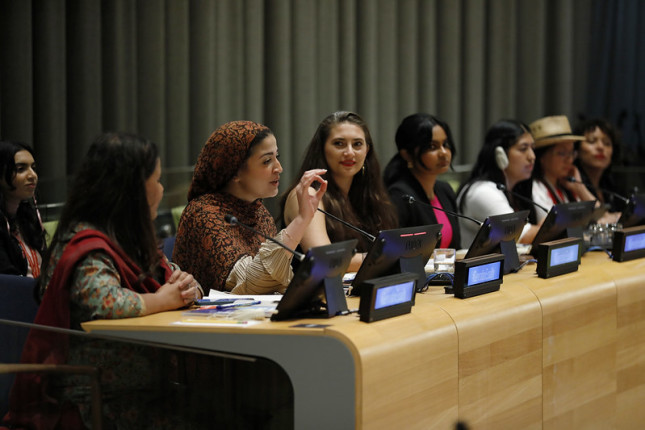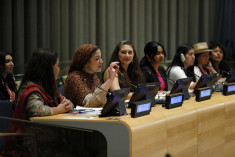-
Connecting the Dots: Women’s Political Empowerment and Reproductive Health
October 4, 2023 By J. Joseph Speidel
The Biden-Harris Administration marked a significant milestone earlier this year by hosting the second Summit for Democracy—which highlighted steadfast commitments to advancing women’s political and civic engagement. Global efforts towards achieving gender equality have not prevented the continuing worldwide underrepresentation of women in political decision-making—hindering progress towards empowerment and equal participation.

The Biden-Harris Administration marked a significant milestone earlier this year by hosting the second Summit for Democracy—which highlighted steadfast commitments to advancing women’s political and civic engagement. Global efforts towards achieving gender equality have not prevented the continuing worldwide underrepresentation of women in political decision-making—hindering progress towards empowerment and equal participation.
Equal participation and leadership in political spheres are essential to achieving the universally agreed-upon goal of global gender equality and empowerment. The limited progress made in achieving gender balance in public life means that urgent investments in women’s lives and rights now have emerged as vital pathways towards achieving true global gender equality. Addressing this disparity also requires advancements in comprehensive sexual and reproductive health and rights (SRHR), with a focus on promoting women’s agency and access to crucial resources.
Women’s Political Power
Promoting women’s right to political participation is essential to achieving global gender equality. The activities include, but are not limited to, the ability to engage in civil society, vote in elections, be elected to government office, serve on boards, and participate in any process that affects them, their families, and their communities.
While considerable progress has been made in securing women’s right to vote worldwide, the same cannot be said for their place in positions of political power. There is a favorable trend emerging in women rise to top political seats worldwide, but the United Nations Development Programme’s Gender Inequality Index (GII) reveals that there is very far to go to reach gender equality and equity.
Of the 191 countries evaluated in the GII, only four countries (United Arab Emirates, Rwanda, Cuba, and Nicaragua) have achieved a 50 percent or more share of parliamentarian seats held by women. Some countries have even implemented quota systems to ensure that a certain number or percentage of members of a governing body are women. Yet it remains important to consider the still existing barriers. Opportunity costs to improve their political role signify the need for thoughtful investments in the lives of women worldwide.
When women have political power and engagement in policymaking processes, they are better able to influence decisions that affect (and benefit) not only themselves, but their families and their communities as well. Extensive research reveals an undeniable link between women’s status and national stability, revealing that societies which tolerate gender discrimination and oppressive norms are more prone to instability and violence.
It also can be argued that greater participation in public life often hinges on women’s ability to exercise autonomy over their own bodies and reproduction. Gender equality and empowerment advocates have identified key investment areas needed to strengthen women’s political participation and decision-making power. The key steps that need such support include meeting the demand for modern contraception and reproductive health, significantly reducing gender-based violence and harmful practices, and respecting, protecting, and fulfilling sexual health and rights.
Women’s Sexual and Reproductive Health and Rights
Many women lack agency concerning their own sexual health. In 2023, 68 countries reported that 24 percent of women are unable to say no to sex. A further 25 percent are unable to make decisions about their own health care, while 11 percent are unable to make decisions specifically about contraception. These figures represent a staggeringly large number of women around the world who are unable to make decisions about their sexual and reproductive health and rights.
Fulfilling the fundamental right for all couples and individuals to decide freely and responsibly the number, spacing, and timing of childbearing requires access to family planning information, contraceptive services, maternal health care, and abortion care. Yet surveys show that as many as a quarter of women in low and middle-income countries (LMICs) who want to either delay or stop childbearing altogether lack access to contraception or have concerns about their safety and possible side effects.
Consequently, about 218 million women of reproductive age (15–49 years) in LMICs have an unmet need for modern contraception. Without access to contraception, girls can experience early pregnancies that may confine their lives to the burdens of childcare and early marriage and deny them access to educational and other life-enhancing opportunities.
A Guttmacher Institute study found that in 2019 of the 228 million pregnancies occurring in LMICs, 111 million (49 percent) were unintended. According to the United Nations Population Fund, 60 percent of unintended pregnancies end in abortion. Since 45 percent of all abortions are considered unsafe, the substandard status of abortion care constitutes a global public health emergency.
A Mutually Reinforcing Relationship
Women’s political empowerment also is closely linked to reproductive empowerment and reproductive outcomes. Improving the conditions that allow for women’s political engagement and participation in decision-making processes will lead to advancements in the status of gender equality and empowerment worldwide. Furthermore, when higher numbers of women occupy positions of authority, greater attention is placed on issues impacting women, reinforcing the importance of investing in SRHR programs from the start.
Creating and sustaining an environment where women can be equal participants in shaping SRHR policies is a key element in the empowerment of women and youth. It is also an important factor in the essential goals of building gender equality, a functioning democracy, and the achievement of the Sustainable Development Goals (SDGs). For instance, increasing women’s political participation can lead to faster maternal mortality decline due to focused policy discussions on raising access to trained birth assistance, prenatal care, contraception, and women’s education.
Recognizing the interdependence of enhanced political engagement and participation in decision-making processes for women and advancements in SRHR on a global scale will lead to progress towards a more peaceful and functioning society. It is necessary to champion efforts for women to find seats at the tables where they can participate in decisions that affect them, their families, and their communities. Empowering women as equal and meaningful participants in shaping policies on issues that affect them is also essential for the cause of gender empowerment, which is intrinsically fundamental for a functioning democracy and the achievement of the SDGs.
Development policy goals of achieving gender equality will not succeed unless women have political agency as well as agency over their own bodies.
J. Joseph Speidel is a Senior Fellow at the Population Institute.
Sources: Feminist Economics; Guttmacher Institute; International IDEA; NPR; Population Institute; SSRN; UN; White House Press Office; Women Deliver.
Photo Credit: Generation Equality Midpoint Moment held at United Nations headquarters in New York. UN Women/Ryan Brown.
 A Publication of the Stimson Center.
A Publication of the Stimson Center.




